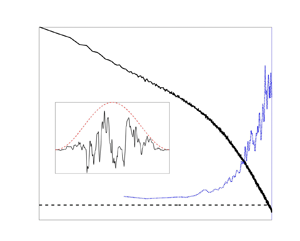Published online by Cambridge University Press: 03 December 2021

The analysis of turbulence by way of higher-order spectral moments is uncommon, despite the relatively frequent use of such statistical analyses in other fields of physics and engineering. In this work, higher-order spectral moments are used to investigate the internal intermittency of the turbulent velocity and passive-scalar (temperature) fields. This study first introduces the theory behind higher-order spectral moments as they pertain to the field of turbulence. Then, a short-time Fourier-transform-based method is developed to estimate these higher-order spectral moments and provide a relative, scale-by-scale measure of intermittency. Experimental data are subsequently analysed and consist of measurements of homogeneous, isotropic, high-Reynolds-number, passive and active grid turbulence over the Reynolds-number range  $35\leq R_{\lambda } \leq ~731$. Emphasis is placed on third- and fourth-order spectral moments using the definitions formalised by Antoni (Mech. Syst. Signal Pr., vol. 20 (2), 2006, pp. 282–307), as such statistics are sensitive to transients and provide insight into deviations from Gaussian behaviour in grid turbulence. The higher-order spectral moments are also used to investigate the Reynolds (Péclet) number dependence of the internal intermittency of velocity and passive-scalar fields. The results demonstrate that the evolution of higher-order spectral moments with Reynolds number is strongly dependent on wavenumber. Finally, the relative levels of internal intermittency of the velocity and passive-scalar fields are compared and a higher level of internal intermittency in the inertial subrange of the scalar field is consistently observed, whereas a similar level of internal intermittency is observed for the velocity and passive-scalar fields for the high-Reynolds-number cases as the Kolmogorov length scale is approached.
$35\leq R_{\lambda } \leq ~731$. Emphasis is placed on third- and fourth-order spectral moments using the definitions formalised by Antoni (Mech. Syst. Signal Pr., vol. 20 (2), 2006, pp. 282–307), as such statistics are sensitive to transients and provide insight into deviations from Gaussian behaviour in grid turbulence. The higher-order spectral moments are also used to investigate the Reynolds (Péclet) number dependence of the internal intermittency of velocity and passive-scalar fields. The results demonstrate that the evolution of higher-order spectral moments with Reynolds number is strongly dependent on wavenumber. Finally, the relative levels of internal intermittency of the velocity and passive-scalar fields are compared and a higher level of internal intermittency in the inertial subrange of the scalar field is consistently observed, whereas a similar level of internal intermittency is observed for the velocity and passive-scalar fields for the high-Reynolds-number cases as the Kolmogorov length scale is approached.